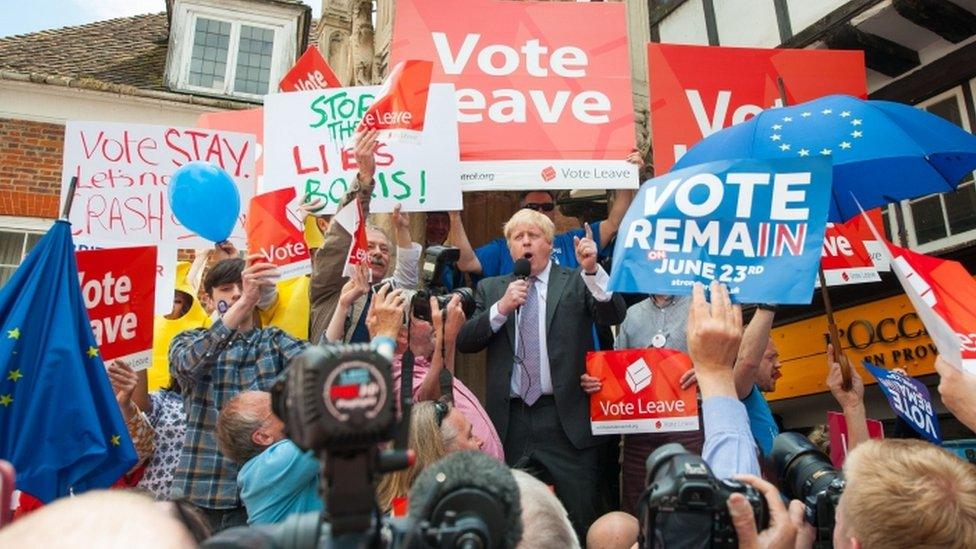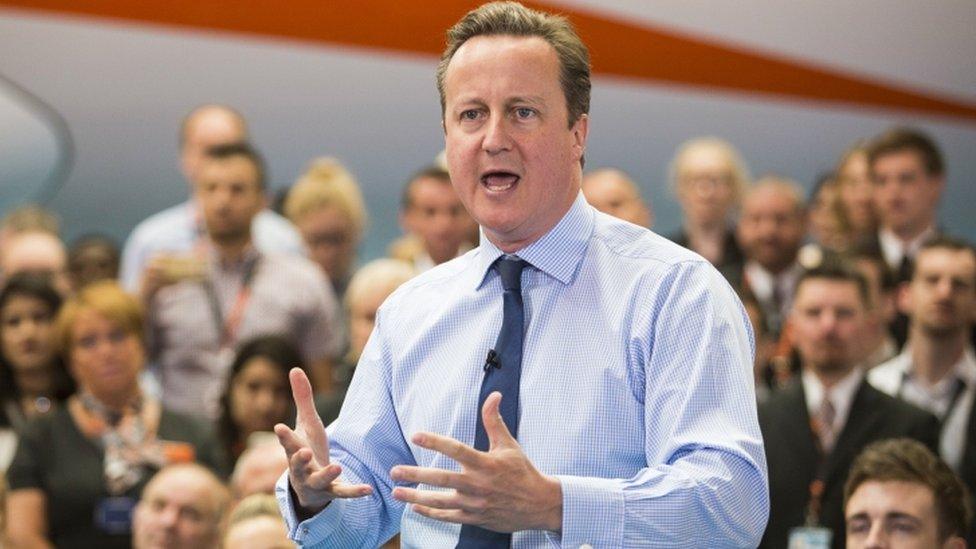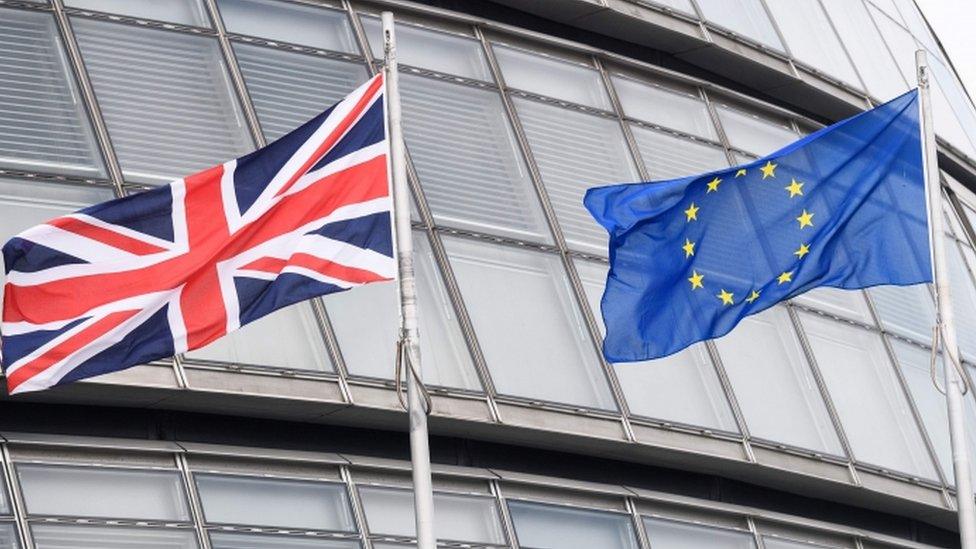Escalation of Tory division over Europe
- Published

Anyone who's followed politics for any length of time knows no party's more prone to suicidal bouts of indiscipline than the Labour Party.
Unless, of course, it's the Conservative Party when it's in the mood.
Just now, the Tories are in more of a mood than they've been since the chaotic days of the Major administration, and possibly since 1990, the year the party hacked down Margaret Thatcher in an orgy of political regicide prompted, naturally, by DNA-deep divisions over Europe.
A surely impossible demand from any senior Conservative for David Cameron to accept his manifesto pledge to reduce net migration into the UK to the tens of thousands is valueless on the ground it's "corrosive of public trust" - in other words because no-one believes it - would be embarrassing enough if delivered in private.
Published in an open letter by Michael Gove and Boris Johnson (Gisela Stuart's a co-signatory, but Labour's internal debate is another story) it amounts to an escalation of a battle that now defies all established principles of government discipline and collective responsibility.
And it does so in a way the prime minister will surely find very difficult to forgive.
Harder still to overlook is the suggestion from once-favoured Employment Minister Priti Patel that the Remain campaign is led by people who are too privileged and rich, too posh, to understand the effect of mass migration on the less well off.
She didn't actually name David Cameron or George Osborne, but it's not immediately apparent which other upper crust, public school and Oxbridge, multi-millionaires at the head of the Remain campaign she might have been referring to.
'Bitter conflict'
There is a big argument at the heart of this.
The Leave campaign calculates that worries about mass migration is a raw nerve which cannot be agitated too hard, or too often.
It's their natural advantage, according to all public opinion research and the anecdotal evidence of countless doorstep encounters.
Almost every Labour MP I meet tells me almost every voter they talk to brings it up, which I mention because Labour supporters matter hugely.
Conservative voters are generally judged to lean naturally towards a "Brexit".
In their open letter, Michael Gove and Boris Johnson's simple point is that EU open borders make immigration control impossible.
The Leave campaign needs that point to hit home.
The political cost of such a tactic may be high.
It accelerates a descent into internecine warfare which now threatens to make the Conservative Party ungovernable if the referendum ends in anything but a decisive victory for the Remain campaign.
So bitter has the conflict become, so taut the tension between the rival factions, that angry Eurosceptic Tories talk privately of challenging the prime minister's position even if Britain votes to stay inside the European Union.

David Cameron insists he would carry on as prime minister if Britain votes to leave the EU.
One of the most militant MPs, Andrew Bridgen, has gone public.
He told me in an interview for BBC Radio 5 live's Pienaar's Politics that he believes it "highly likely" at least 50 Tory MPs would sign demands for a vote of no confidence in the PM if the campaign goes on as it has.
More than that, he suggests the Cameron administration could be reduced to what he and others call a "zombie government" by its divided MPs, unable to govern and forced to consider a snap election.
Vote of confidence?
At Westminster, that kind of apocalyptic talk is becoming more common.
Some of the whispering is - and is probably intended to be - hair-raising.
I've heard it suggested that three members of the Cameron administration have become so upset by the tone of campaigning on the Remain side led by the prime minister that they are contemplating resignation, not just from the government, but from the Tory whip, effectively quitting the party.
True? We may never know. But the whispering is becoming feverish.
One MP on the now militant Eurosceptic wing said letters demanding a vote of confidence in the PM had already been submitted to the chairman of the Conservative 1922 Committee, Graham Brady, who's a sort of posh shop-steward for Conservative MPs.
Mr Brady himself is bound by a sacred oath of secrecy where such matters are concerned, so we must wait to find out.

The outcome of the UK's EU referendum will be known on Friday, 24 June
The Sunday Times newspaper carries more mutinous muttering.
Former Environment Secretary Owen Patterson told the paper: "The government now has four weeks to behave properly.
"If they don't, there are risks they will cause long term damage to the Conservative Party."
Another, unnamed MP, puts it more bluntly: "When you tell Tories they are immoral for supporting Brexiteers you are going to get a kick in the nuts."
We'll see, of course. Everything depends on which side wins the referendum, and perhaps on the margin of victory.
Mr Cameron insists he would carry on as prime minister if Britain votes to leave the EU.
The more common view, shared among his closest supporters, is that he would be toast.
'Zombie government'
If the vote is to remain an EU member, the reaction of Conservative MPs will be more a matter of chemistry than maths.
Angry Eurosceptics (should we be calling them EU-rophobes?) may, or may not, be cross enough and strong enough in numbers to force a vote of confidence in the prime minister.
Even then, winning that vote would be a tall order. It would need the support of 165 MPs. Not easy.
More immediately worrisome, it would need a fraction of that number - just nine Tory MPs - to defeat any government vote in the Commons when combined with all opposition parties.
On a realistic estimate, about 25 Conservatives are now sufficiently irate to press for a vote of no confidence in the PM.
Fewer than half that number could produce the "zombie government" to which Andrew Bridgen referred.
Ministers could be forced to discard any proposal that might meet any serious opposition, governing as if it was a minority, not a majority administration.
Life would suddenly become very difficult.
So a vote to remain could be a Pyrrhic victory if the margin is tight.
And until we know the outcome on Friday 24 June, this self-destructive struggle is likely to intensify before it calms again - assuming, that is, the party is not already broken beyond repair.